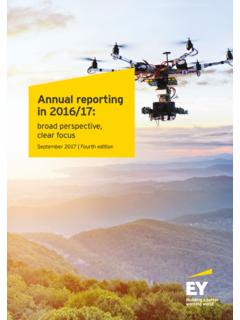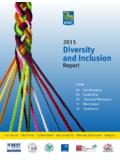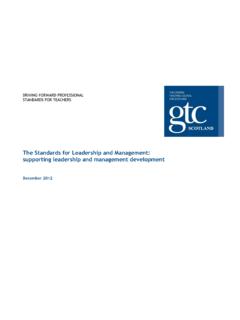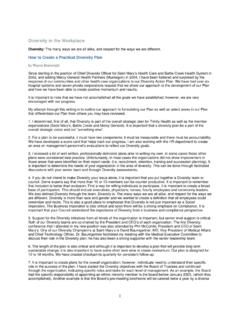Transcription of A Report into the Ethnic Diversity of UK Boards - EY
1 A Report into the Ethnic Diversity of UK BoardsSir John Parker The Parker Review CommitteeFinal Report 12 October 2017 In association withContentsMinisterial Foreword 2A Welcome Letter from Sir John Parker 4 Executive Summary 6 Recent Developments: From Consultation to Implementation 12 The Background to the Parker Review 20An Introduction: Ethnic Diversity of UK Boards 24An Analysis of Ethnic Diversity in UK Boards 28 Increasing the Ethnic Diversity of UK Boards The Commercial Case 32 Increasing the Ethnic Diversity of UK Boards Finding the Talent 38 Approach to Recommendations 44 Parker Review Recommendations 46 Appendices 50 Appendix A: Questions for Directors 51 Appendix B: The Directors Resource Toolkit 53 Appendix C: Case Studies 58 Appendix D: Methodology 67 Biographies 68 Members of the Steering CommitteeChair: Sir John Parker GBE, FREng Co-Chair: David Tyler Members.
2 Trevor Phillips OBE Helen Mahy CBE Ken Olisa OBE Amy Winepress, EY Tom Shropshire, Linklaters LLP Yvonne Thompson CBE Neil Carberry, CBI Sanjay Bhandari, EY Shabbir Somani, EYExpert AdvisersProfessor Susan Vinnicombe CBE, Cranfield School of Management Dr Doyin Atewologun, School of Business & Management, Queen Mary University of London and Visiting Fellow, Cranfield School of ManagementObserverItiola Durojaiye, Department for Business, Energy & Industrial StrategyAcknowledgementsCBI Department for Business, Energy & Industrial Strategy EY Green Park Executive Recruitment Institute of Directors Linklaters LLP Michael Eboda Tulchan Communications Webber PhillipsBeyond One by 21 Essential to the effective functioning of any Board is dialogue which is both constructive and One of the ways in which constructive debate can be encouraged is through having sufficient Diversity on the Board. This includes, but is not limited to, gender and race.
3 Diverse Board composition in these respects is not on its own a guarantee. Diversity is as much about differences of approach and experience, and it is very important in ensuring effective engagement with key stakeholders and in order to deliver the business strategy. The Financial Reporting Council (April 2016)2 Building an inclusive and diverse workplace which draws on the talents of all of our people, is vital to the UK Economy and is a key part of our Industrial Strategy. If companies are not recruiting from the whole of society, then they are missing out on UK labour market is thriving, with more people in work than ever before. Whilst we are proud of this, Sir John Parker s Report shows that there is a great deal more that needs to be done to ensure that Ethnic minorities are able to participate fully at senior levels of UK we see from the Report , UK citizen directors of colour represent only 2% of directors in FTSE boardrooms, a small fraction of the proportion of the population that has an Ethnic minority background.
4 It is clear that the boardrooms of Britain s leading companies do not currently reflect the Ethnic Diversity of either the UK or their key stakeholders, including customers, suppliers and employees, that are critical to the future of their businesses. It is important that people are able to work in a workplace where differences are embraced, whether they are differences of race, gender, social background, sexuality, age or even differences of perspective and personality. Sir John has clearly laid out the commercial case for having a diverse board. As well as contributing to a fairer society, an inclusive environment helps employees to perform at their best. It increases productivity and contributes to our economic well-being. Sir John s Report also emphasises the importance of leadership at the highest level of business, as well as brand, culture, talent and the supply would like to thank Sir John and his steering group for leading this work and for championing this very important agenda.
5 Our success in improving gender Diversity shows how embedded cultures can change when business addresses the challenge. I encourage companies to act on the recommendations set out in the Report and I am optimistic that with strong leadership from business we will see real progress in improving Ethnic Diversity in Boards over the next few James MP Minister for Small Business, Consumers and Corporate ResponsibilityMinisterial ForewordMargot James MP, Minister for Small Business, Consumers and Corporate Responsibility32A Report into the Ethnic Diversity of UK BoardsA Welcome Letter from Sir John ParkerWe business leaders know that we cannot operate successful enterprises without the support of our many stakeholders, including our customers, shareholders and they want to be assured that the composition of our Boards not only includes the best range of talent, skill sets and relevant experience available to us, but that they also broadly reflect those we serve and those who work as part of our companies have made great progress on gender Diversity but we still have much to do when it comes to Ethnic and cultural Diversity as a business of us in business would attest that our experience on Boards that embrace gender and Ethnic Diversity benefit in their decision making by leveraging off the array of skills, experiences and diverse views within such a the UK, our talent pool is changing as the composition of our society changes along with our customer base at home and overseas.
6 The databases of a number of executive search firms demonstrate that a range of ethnically diverse eligible candidates, who could be considered for a number of job specifications in the Boardroom, are available now. As time passes, this pool of talent will be enhanced and grow. Based on my experiences as a member of Lord Davies review of Women on Boards , I am confident that by setting out practical issues and coming up with aspirational and realistic objectives and timescales, progressive business leaders will respond and trust Boards will see our recommendations as business friendly reminding us of our need to continue to earn our licence to operate in society and as an initiative to align our Board composition more broadly with our customer base. Those of us that have been on the journey with more diverse multi- Ethnic (male and female) and multi-cultural Boards have found the journey not only rewarding, but less daunting than some might see this review, we set out a series of recommendations for your consideration, which we hope will engender fruitful debate within the business community in particular.
7 We also hope that our Boardroom recommendations will be considered alongside the review of Ethnic Diversity and the labour market that was led by Baroness McGregor-Smith and published in February am grateful to all of my Review Committee colleagues for their unstinting voluntary service. My thanks, in particular, to Trevor Phillips for his valued and wise counsel and input partly based on his former experience as Chairman of the Commission for Racial Equality, to Amy Winepress as Secretary and Coordinator of the Steering Committee for her valued support, and to Tom Shropshire for his fine efforts to help finalise the want to extend our special appreciation to the Partners of EY and latterly Linklaters for their funding and support without which this Report could not have been completed. I am also grateful to Tulchan Communications for their advice and , I would like to thank all of the people and companies that took time to provide us with valuable feedback during the consultation period.
8 I was heartened to see the widespread support for the recommendations and the importance that enhancing Diversity in our Boardrooms could have in the future success of the UK. Given the changes occurring in the world, and here within the UK, it has only become more essential that we keep our companies prepared for new social, political and economic realities. Leadership comes from all levels within an organisation, but leadership, both in word and deed, is essential in the Boardroom, and I look forward to seeing changes in that environment that will continue to keep corporate Britain at the forefront of global John Parker GBE, FREng54A Report into the Ethnic Diversity of UK BoardsWe believe that in order for corporate Britain to reflect the progress that is being made in Diversity , equality and inclusion generally, changes are needed in the Boardrooms where leadership, stewardship and corporate ethics are of utmost importance. However, the recommendations we are making are underpinned by strong industrial logic and the need for UK companies to be competitive in the increasingly challenging and diverse Examination of the FTSE 100:1,050 director positions in totalUK citizen directors of colour represent only about 2% of the total director population 85 individual directors of colour (four hold two Board positions)Total directors of colour represent about 8% of the total (compared to 14% of the UK population)51 out of the FTSE 100 companies do not have any directors of colourSeven companies account for over 40% of the directors of colourFive out of the seven companies have headquarters historically located outside the UKOnly six people of colour hold the position of Chair or CEOData as of end-July 2017 Executive Summary A Report into the Ethnic Diversity of UK Boards .
9 Beyond One by 21 1 We accept that no noun/group of nouns would be perfectly suitable and use the broad term people of colour to capture individuals with evident heritage from African, Asian, Middle Eastern and South American regions. Thus, the focus in this Report is on non-white directors. 2 Older BME People and Financial Inclusion Report : The future ageing of the Ethnic minority population of England and Wales , Nate Lievesley, Runnymede Trust and the Centre for Policy on Ageing (July 2010). 3 Id. 4 United Nations Department for Social and Economic Affairs [ ] (Jul. 2015).5 Report by Capital Group (2013).The Current State of AffairsAs a general matter, the Boardrooms of Britain s leading public companies do not reflect the Ethnic Diversity of either the UK or the stakeholders that they seek to engage and represent. This Report highlights that Ethnic minority representation in the Boardrooms across the FTSE 100 is disproportionately low, especially when looking at the number of UK citizen directors of and responding to cultural and demographic change is a major commercial imperative both in the UK and globally.
10 We must all recognise, business included, that the UK has changed dramatically over the past 40 years: Today, approximately 14% of the total UK population is a person of colour , or from a non-white Ethnic group1 up from just over 2% in 1971. By 2030, it is expected that the proportion will be closer to 20% of the total UK By 2051, it is expected that the proportion of people of colour in the UK will reach to over 30% of the total UK Between 2015-2050, one-half of the world s population growth will be concentrated in nine countries, five of which are in Africa and three in The FTSE 100 derives more than 75% of its sales from outside the UK, and for the FTSE 250 that proportion is over 50%.5 Understanding the imperatives around this issue, from the perspectives of both the companies and the target individuals is key to finding a long-lasting solution to Boardroom and pipeline deficit we are seeking to address. The Steering Committee believes that it is important that FTSE 100 and FTSE 250 companies change the way they approach the issue of Ethnic Diversity in the Boardroom and the pipeline, and that despite the efforts being made, in many cases they cannot be seen to be successful or sufficient.
















